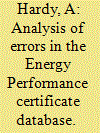| Srl | Item |
| 1 |
ID:
166543


|
|
|
|
|
| Summary/Abstract |
Energy Performance Certificates (EPCs) are the adopted method by which the UK government tracks the progress of its domestic energy efficiency policies. Over 15 million EPCs have been lodged, representing a valuable resource for research into the UK building stock. However, the EPC record has a reputation of containing multiple errors. In this work, we identify many such errors and quantify how common they are. We find that 27% of EPCs in the open EPC record display at least one flag to suggests it is incorrect and estimate the true error rate of the EPC record to be between 36 and 62%. Many of these errors are caused by EPC assessors disagreeing on building parameters such as floor type, wall type and built form. Additionally, flats and maisonettes appear to cause more issues than other property types. This may be due to difficulties in assessing their location in the building and the nature of the surrounding space. We also suggest potential new methods of quality assurance which rely on machine learning and which could allow such errors to be avoided in the future.
|
|
|
|
|
|
|
|
|
|
|
|
|
|
|
|
| 2 |
ID:
166305


|
|
|
|
|
| Summary/Abstract |
Keeping homes at a comfortable temperature and reducing household fuel bills are priorities for many governments. In the UK, several interventions have been implemented to achieve these objectives. This paper investigates one such policy lever - the Energy Price Cap - to understand if it has been designed and implemented efficiently and equitably. The price cap was introduced for customers on prepayment meters to combat increased levels of fuel poverty and a lack of competition in this group. However, the price cap was based on several assumptions of how energy is used. In this work, we assess how well the price cap accounts for real energy use using smart meter data. Households on economy 7 (EC7) tariffs were found to spend more than those on standard rate tariffs, as EC7 customers use more electricity during peak hours than assumed in government calculations. Additionally, many of the EC7 customers in this sample still use a considerable amount of gas, suggesting the EC7 heating product is either not sufficient, or is not being utilised in a cost-effective manner. Revisions to the input assumptions in government models for EC7 customers would therefore be beneficial in future price cap levels.
|
|
|
|
|
|
|
|
|
|
|
|
|
|
|
|